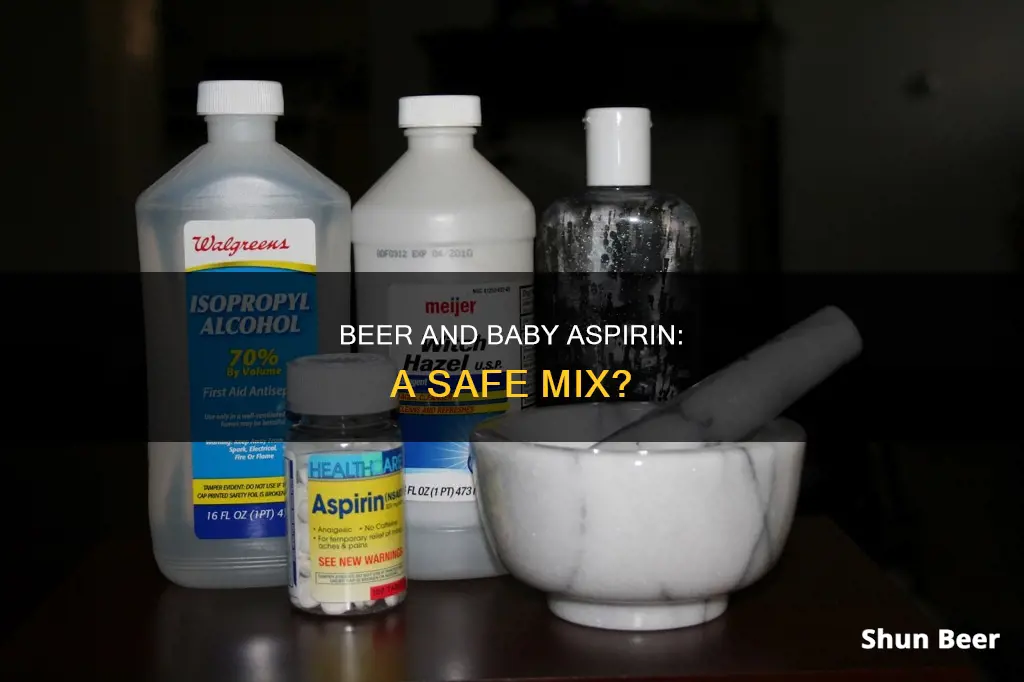
Drinking beer and taking aspirin, even a baby aspirin, is not recommended. Both substances are blood thinners, and when combined, they can increase the risk of severe bleeding during an accident or injury. Additionally, the combination can cause gastrointestinal distress, including nausea and vomiting, and can increase the risk of or worsen ulcers, heartburn, or stomach upset. The risk of gastrointestinal bleeding is also heightened, and while this is usually not life-threatening if treated quickly, it can be dangerous if left untreated. Furthermore, both substances can put stress on the liver, and when combined, they can substantially increase the risk of liver damage and chronic liver disease.
| Characteristics | Values |
|---|---|
| Can I drink beer and take baby aspirin? | It is not recommended to mix alcohol and aspirin. |
| Why? | The combination can cause gastrointestinal distress, including nausea and vomiting, and can increase the risk of stomach bleeding, ulcers, and liver damage. |
| What should I do if I want to drink alcohol and take aspirin? | Speak to your doctor first. If you do decide to drink alcohol while taking aspirin, follow the FDA's recommendations for daily alcohol intake. |
What You'll Learn

Increased risk of gastrointestinal bleeding
Mixing aspirin and alcohol can cause gastrointestinal bleeding, which can be life-threatening. Alcohol can increase your risk of stomach bleeding caused by aspirin. The more alcohol consumed, the greater the risk of gastric distress.
A person who drank more than five drinks each day had 6.3 times the risk of gastrointestinal bleeding. This can result in dangerous blood loss and anaemia over time. Gastrointestinal bleeding often appears as dark-red or black, tarry stools, or bright-red blood in vomit. However, it is not always easy to see.
If you are taking aspirin, it is important to stick to the FDA's recommendations on daily alcohol intake to minimise the risk of gastrointestinal bleeding. For healthy women of all ages and men over 65, it is recommended to have no more than one drink per day. For men under 65, it is recommended to have no more than two drinks per day.
If you are taking aspirin, it is best to avoid drinking alcohol entirely or to take aspirin early in the morning to minimise the risk of gastrointestinal bleeding.
Beer and Milk: A Healthy Mix?
You may want to see also

Increased risk of liver damage
Combining alcohol and aspirin can lead to an increased risk of liver damage. Both substances put stress on the liver, and when combined, they can cause substantial liver damage. The liver is responsible for flushing out toxins from the body, and when it has to process drugs like alcohol and aspirin, it can be overworked, leading to potential damage and possible disease if the issues persist.
The risk of liver damage is heightened when alcohol and aspirin are consumed in excess over a prolonged period. This can lead to permanent damage to the liver and serious health complications, including chronic liver disease. It is important to note that even small doses of aspirin, such as "baby aspirin," should not be mixed with alcohol.
The signs and symptoms of potential liver damage include significant fatigue and exhaustion, unexplained weight loss and lack of appetite, nausea and vomiting, and pain in the upper right side of the abdomen. If you experience any of these symptoms, it is crucial to seek medical attention as soon as possible.
To reduce the risk of liver damage, it is recommended to abstain from alcohol consumption or to limit alcohol intake as per the guidelines provided by health organizations. It is also important to consult a healthcare provider before taking aspirin, especially if you have an alcohol use disorder.
Beer and Rifampin: Safe or Not?
You may want to see also

Increased toxicity of both substances
When you mix alcohol and aspirin, the liver has to work harder to process both substances. The liver's inability to process the aspirin and alcohol simultaneously results in increased toxicity. This increased toxicity can cause a range of adverse effects, such as:
- Alcohol entering your bloodstream more quickly, leading to faster impairment.
- Higher blood alcohol content (BAC) than if you hadn't taken aspirin, which can cause problems operating vehicles.
- Increased risk of overdose.
- Increased sleepiness, lightheadedness, and difficulty breathing.
The increased toxicity of both substances can have serious consequences, and it is important to understand the risks before consuming alcohol while taking aspirin. It is always recommended to consult a doctor or healthcare provider before mixing any medication with alcohol.
Additionally, it is important to note that the size of the aspirin dose may also play a role in the potential side effects. While a smaller dose may reduce the likelihood of counter-interactions with alcohol, even a low dose of aspirin can still lead to adverse effects when combined with alcohol. Therefore, it is crucial to follow the recommendations of healthcare providers and the FDA when it comes to mixing aspirin and alcohol.
Beer Drinking and Six-Pack Abs: Friends or Foes?
You may want to see also

Alcohol may affect how the body absorbs aspirin
The Food and Drug Administration (FDA) recommends that people who take aspirin regularly limit their alcohol consumption to avoid gastrointestinal bleeding. This type of bleeding can be life-threatening if not treated promptly. It can result in dangerous blood loss and anaemia over time. Symptoms of gastrointestinal bleeding include dark-red or black, tarry stools, or bright-red blood in vomit.
The combination of aspirin and alcohol can also increase the risk of liver damage. Both substances put stress on the liver, and when combined, they can substantially increase the damage. Prolonged use of both together can lead to permanent liver damage, resulting in serious health complications and even death.
Additionally, mixing alcohol and aspirin can increase the toxicity of both substances. The liver struggles to process them simultaneously, resulting in increased toxicity in the bloodstream. This can lead to problems operating vehicles, an increased risk of overdose, and increased sleepiness, lightheadedness, and difficulty breathing.
Therefore, it is important to follow the FDA's recommendations for daily alcohol intake if you are taking aspirin. It is also crucial to consult your doctor before consuming alcohol with aspirin and to inform them about all other medications, vitamins, and herbs you are taking.
Beer at Wortman Park: What's the Law?
You may want to see also

Mixing aspirin and alcohol can cause or worsen ulcers
Mixing aspirin and alcohol can have adverse effects on your health. While it is not recommended to drink alcohol and take aspirin simultaneously, drinking alcohol while on a daily aspirin regimen can be beneficial to your health in some cases. However, it is important to understand the risks associated with mixing the two.
Aspirin is a non-steroidal anti-inflammatory drug (NSAID) and a popular over-the-counter pain reliever. It is often prescribed to reduce fevers and relieve mild to moderate pain, such as muscle aches, toothaches, colds, and headaches. A daily aspirin regimen may also be recommended by doctors for those with chronic coronary artery disease or to reduce the chance of stroke.
When mixed with alcohol, aspirin can cause or worsen ulcers. Ulcers are sores that develop in the lining of the stomach or small intestine. Alcohol can irritate the stomach and, when combined with aspirin, increase the risk of stomach ulcers. This is because alcohol can affect how the body absorbs and metabolizes aspirin, delaying its effects. The combination of aspirin and alcohol can also contribute to gastrointestinal distress, including nausea and vomiting.
The risk of gastrointestinal bleeding is another serious concern when mixing aspirin and alcohol. Aspirin is a blood thinner, and alcohol increases blood pressure. Therefore, mixing the two can lead to prolonged gastrointestinal bleeding, which may be life-threatening if not treated promptly. Additionally, the combination of aspirin and alcohol can increase the risk of liver damage and toxicity, as both substances put stress on the liver.
To minimize the risks associated with mixing aspirin and alcohol, it is important to follow the recommendations of healthcare providers and regulatory bodies such as the Food and Drug Administration (FDA). People who take aspirin regularly should limit their alcohol consumption. It is recommended that healthy women of all ages and men over 65 years old have no more than one drink per day while taking aspirin. For men younger than 65, it is advised to not exceed two drinks per day. Spacing out aspirin and alcohol consumption as much as possible during the day can also help minimize the effects.
Beer and Augmentin: Safe Mix?
You may want to see also
Frequently asked questions
It is not recommended to mix alcohol and aspirin. Beer and baby aspirin should not be mixed due to the increased risk of stomach bleeding, ulcers, and liver damage.
Common side effects of mixing aspirin and alcohol include nausea, vomiting, and an increased risk of gastrointestinal bleeding. In addition, the combination can lead to liver damage and increased toxicity of both substances.
Aspirin is a blood thinner, and alcohol increases blood pressure. When combined, this can lead to prolonged gastrointestinal bleeding, which may be life-threatening.
It is generally recommended to avoid mixing any pain medications with alcohol. However, acetaminophen is considered a safer alternative to aspirin when drinking, as it does not increase the risk of ulcers or liver damage.







